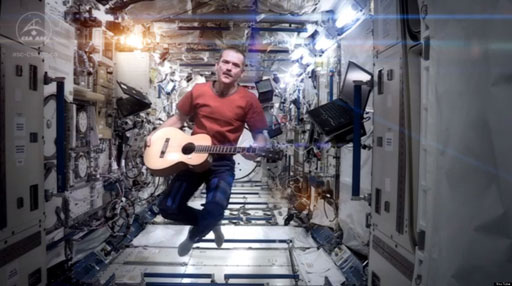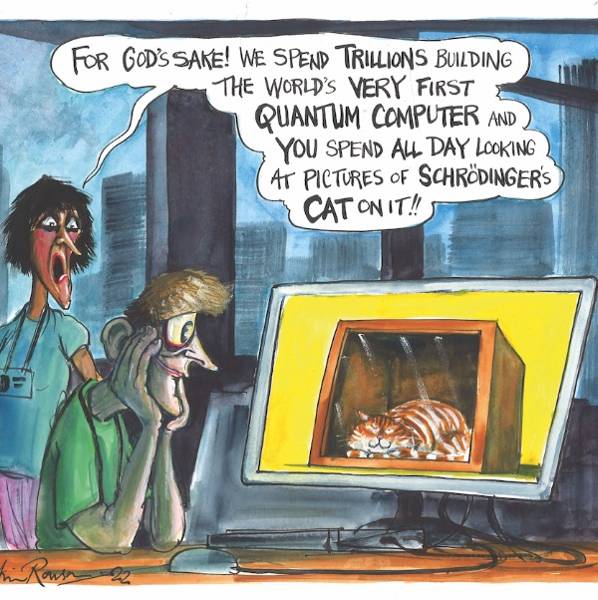
Given that it's clocking up YouTube views at an extraordinary rate, it seems unlikely that you'll have missed it, but just in case I highly recommend watching NASA Commander Chris Hadfield's final broadcast from the International Space Station.
The Canadian astronaut has been at the ISS since December 2012, and during his five months in orbit has built up a huge cult terrestrial following with his amusing YouTube videos (here he is brushing his teeth in space) and stunning pictures of Earth landmarks, posted directly to his 500,000+ Twitter followers.
Due to return to Earth tomorrow (14 May), Hadfield needed to bow out in style, and he has certainly delivered, recording a full music video (the first to be recorded in space) of himself covering the greatest song about Earth orbit – David Bowie's 1969 classic "Space Oddity".
Watching the weightless Hadfield serenade us about ground control and Major Tom, I was reminded me of why I've always been a fan of astronauts. Aside from their pioneering spirit (which I think goes without saying), on the whole they just tend to come across as great people. One of my favourite non-fiction books is Andrew Chaikin's history of the Apollo program, A Man on the Moon, which, in addition to being a riveting account of how the project expanded the frontiers of science and human exploration, provides fascinating insight into the good-natured camaraderie that characterised the quest to land human beings on another world.
At the heart of Apollo, especially among those men talented and fortunate enough to actually travel to the Moon, was a humility that you might not instinctively expect to find within a group who knew they were joining the list of history's great pioneers. Take, for example, the late Neil Armstrong – as the first man to step on the Moon, he was destined to be hailed as a hero, but it was never a badge he wore comfortably. Keen to play down his position as the man who took those first steps, Armstrong said that "Circumstance put me in that particular role", and in later life would emphasise the role played by the huge team behind Apollo: "When you have hundreds of thousands of people all doing their job a little better than they have to, you get an improvement in performance. And that's the only reason we could have pulled this whole thing off."
What's also striking is the lack of jingoism among those involved in space travel. Given that the space race formed a component of the Cold War, it's remarkable that the astronauts (and cosmonauts) were able to retain a sense that their work transcended national boundaries. Yuri Gagarin was hailed as a global hero when he became the first man in space and, while it's important not to ignore the planting of US flags, the Apollo astronauts did not present their missions as a purely American endeavour, a message exemplified by the words on the plaque left on the Moon's surface by the Apollo 11 astronauts: "Here men from the planet Earth first set foot upon the Moon. July 1969 AD. We came in peace for all mankind." It's a spirit which has continued with the modern-day space programme, with nations collaborating on the ISS project (when he returns to Earth tomorrow, Hadfield will do so aboard a Russian Soyuz craft).
Those are some serious, honourable qualities. But what I personally love the most about astronauts is that the profession appears to have a long history of enjoying a joke. Reading Andrew Chaikin's book, one of the things I learned was that the Apollo programme was the backdrop for some of the most expensive gags in history.
Take Apollo 12, for example. The astronauts – Charles "Pete" Conrad, Alan Bean and Richard F. Gordon – had the tricky task of following the grandiose feat of Apollo 11, and knew they would never be as feted as the men who went before them. Their response? Go up to the Moon and have a great time. Stepping on to the surface on 19 November 1969 as the third man to place a foot on an extraterrestrial body, Conrad chose to take the tone down from Armstrong's "giant leap" of 20 July of the same year. "Whoopee!" cried the 5ft 6in astronaut. "Man, that may have been a small one for Neil, but it's a long one for me." Not only did the quote fulfil a bet Conrad had made back on Earth, but it also embodied the spirit of the whole mission. Even the crew's colleagues on the ground were in on jokes – the backup crew famously hid miniature photos of Playboy playmates within the Apollo 12 mission lunar check list.
The trend would continue on later missions. During one of the moonwalks of Apollo 14, veteran astronaut Alan Shepard, who had been told in 1964 that he would never fly again due to an inner ear problem, devoted a few minutes to whacking golf balls across the Moon's surface, using a six-iron head attached to a lunar scoop handle which he had constructed specially for the occasion. And in what could be my favourite piece of lunar tomfoolery, Apollo 17's Harrison Schmitt and Eugene A. Cernan were captured on camera bouncing across the surface while singing "I was strollin' on the Moon one day".
Now, into this grand tradition steps Chris Hadfield. He's no stranger to in-space humour (see the UFO-based April Fools stunt he pulled last month), but his cover of Space Oddity is something else entirely. Amusing, poignant, and the ultimate tribute to a different kind of pioneer, the great David Bowie.
Commander Hadfield – we salute you.

